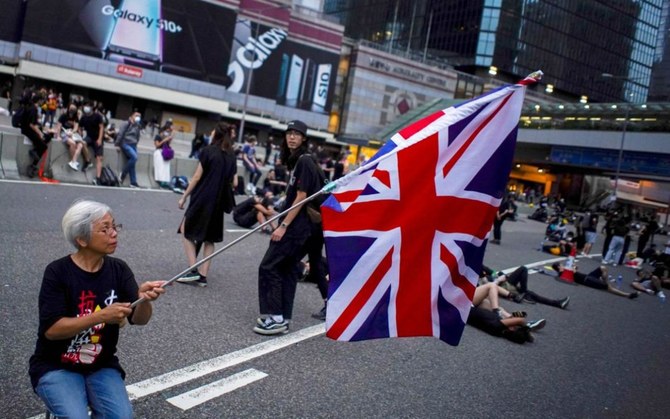China and Britain wage war of words over Hong Kong

China bluntly told Britain on Wednesday to “refrain from further interference” and London summoned Beijing’s ambassador for a dressing down in a rapidly-escalating diplomatic feud over Hong Kong.
The protests sweeping the former British colony have also revived tensions inherent in the two sides’ historic agreement on the global financial hub’s handover to Chinese rule 22 years ago.
Hong Kong was meant to continue enjoying broad freedoms under the “one country, two systems” approach first adopted by China in the 1980s.
But fears and frustrations over Beijing’s gradual tightening of those rules spilled over into mass demonstrations against a now-stalled draft law on Hong Kong residents’ extradition to China.
They also saw UK Foreign Secretary Jeremy Hunt — one of two candidates to become Britain’s next prime minister — take the global lead in condemning China’s entire approach to its “special administrative region.”
Hunt called on Beijing not to use the protests as a “pretext for repressions” and warned of “serious consequences” if China breaches the commitments it made to London decades ago.
His comments provoked a cascade of condemnations from China that began with its foreign ministry in Beijing and continued with its embassy in London.
“He seems to be fantasising in the faded glory of British colonialism and in the bad habit of gesticulating while looking down on other countries’ affairs,” Chinese foreign ministry spokesman Geng Shuang told a regular briefing in Beijing.
“I need to re-emphasize that Hong Kong has now returned to its motherland.”
The diplomatic offensive raged on at a hastily-convened press conference in London by Chinese ambassador Liu Xiaoming.
“I do hope that the British government will realize the consequences and would refrain from further interference from further damaging their relationship,” Liu said.
He spoke moments before being summoned by the Foreign Office for a private meeting with UK diplomatic service chief Simon McDonald.
Liu was informed “that the comments made on UK policy toward Hong Kong by the Chinese ministry of foreign affairs spokesperson were unacceptable and inaccurate,” a UK Foreign Office spokesman told AFP.
The sides’ relations are turning into a hot-button issue in London because of both Britain’s impending exit from the European Union and the imminent adoption of 5G technology.
Brexit is forcing Britain to seek closer trade relations with the United States and the booming economies of Asia.
And China’s controversy-hit Huawei telecoms giant has assumed the global lead in rolling out the next-generation mobile network that should serve as a gateway to the “Internet of things.”
Britain has been under pressure from the United States to drop Huawei from its plans over national security concerns — and from China about the consequences to trade if it does.
Hunt appeared to try to both soften his earlier comments and reassert his leadership credentials in a television interview broadcast on Wednesday evening.
“I’ve been very reasonable with the Chinese. I’m someone who believes we should be the best of friends with China, I want us to trade with China,” Hunt told Channel 4 News.
“I want us to have the best possible understanding between two of the great countries in the world.”
Hunt has been playing up his diplomatic and business credentials in the two-man race with former London mayor Boris Johnson to succeed Prime Minister Theresa May at the end of the month.
He has portrayed himself as an experienced one-time entrepreneur who knows how to reach agreements on prickly issues while securing Britain’s interests abroad.
Johnson told a campaign event on Wednesday that he backs the Hong Kong protesters “every inch of the way.”
